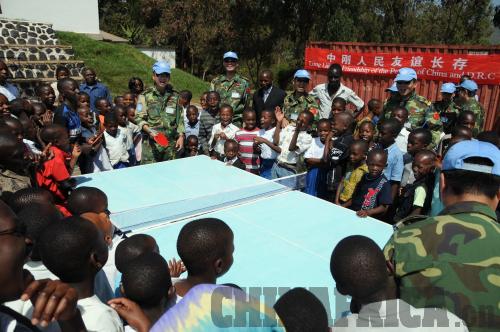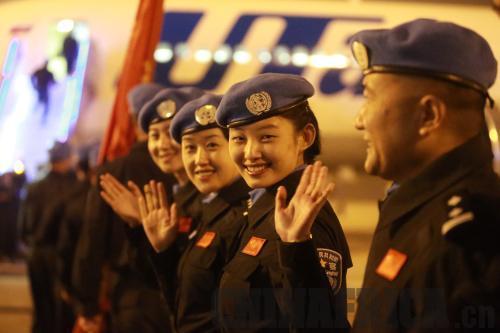| 
Chinese peace keepers in Africa give local kids table tennis lessons
The China- Africa relationship is more oftenthannot associated with business. The image of this business can vary from Chinese contractors in brown overalls tightening girders on new superhighways, to Chinese executives in black suits making deals with African governments and traders operating retail shops in rural villages.At any given moment, there are at least 250 Chinese-led projects underway in Africa, be it oil, infrastructure construction or real estate.
But Africa, despite its potential market of 1 billion people and massive natural resource deposits, is also a continent where danger lurks. It is dotted with civil wars and insecurity, especially where resources are abundant.Somalia, Democratic Republic of the Congo (DRC) andMozambiqueare some of the countries where conflict is ever present.
Continent of conflict
Between 1990 and 2005, Africa accounted for half of the number of deaths caused by civil war, terrorism or violence, according to a 2011 paper by the University of Nairobi's Institute of Diplomacy and International studies. This cost Africa $300 billion in terms of resources destroyed and number of people killed.
While adhering to its core foreign policy philosophy of non-interference in the affairs of others,Chinahas at the same time not turned a blind eye to the conflict in Africa. For example, Chinese writer Liu Binjie writes in his bookChina's Philosophy on Foreign Affairs in the 21st Century, thatChina's policy of engagement in this 21st century would be that "of peace with the goal of maintaining and promoting common development."
WhileChinadoes not have a permanent military base in Africa, figures from the UN Department of Peace Keeping Missions indicate that the role ofChinain peace keeping on the continent has increased in the past 10 years.
Chinahas sent troops and observers to UN missions in the DRC,Sudan,Cote d'Ivoire,Liberiaas well as the Saharawi, the figures show. Globally,Chinahas become one of the top 20 contributors to peacekeeping operations in the UN.

Volunteers prepare to leave on a peace mission
Getting involved
In addition, financial support, training and active participation in UN programs geared toward conflict resolution are starting to becomeChina's priorities.Chinahas, for instance, provided financial support to the AU's Somali peacekeeping mission (Amisom) since 2008. Amisom, which is still fighting al-Shabaab militants, has succeeded in bringing relative security toMogadishu. With the security in the capital improved, last year Somalis voted in a president for the first time on home soil.
China's recent change of strategy is now becoming a subject of analysis. The country cast its first vote on peace keeping in 1981, when it voted to authorize the extension of the UN Peacekeeping Force in Cyprus (UNFICYP).Chinafirst participated in a UN peacekeeping operation in 1989, when 20 Chinese military personnel took part in the UN Transition Assistance Group (UNTAG) to help monitor elections inNamibia. Since then, it has been one milestone after the other. (see box)
Analysts assert thatChina's participation has been influenced by the growing importance of the China-Africa relationship.
"I thinkChinais doing all this [peace keeping] in the context of its quest to expand its influence in Africa. You cannot get these things [trade agreements] in a turbulent place," Epuuli Kasaija, a Ugandan scholar who has written extensively on conflicts in the Great Lakes region of Africa, toldChinAfrica.
Dr. Douglas Johnson, an expert on security issues in the Horn of Africa, saidChina's contribution has not been trumpeted perhaps mostly because it concentrates on keeping a low profile.
"There is enough research that showsChina's role in fighting piracy off the coast of East Africa.Chinais also present in almost all conflicts where UN missions are [operating]. But perhaps as global geopolitics change, this role will be more pronounced.China, like other great powers, will have to be involved, because there is a lot to lose if it doesn't."
Change of heart
Some security analysts on the continent who were initially pessimistic about the coming ofChinaare starting to change heart.
"I have been initially very cynical about the Chinese involvement in Africa, but they have realized that there [can't be] business as usual when people are fighting," said Rocky Hitchcock, a security expert with KK Security Services inNairobi.
"I understand they [China] have given out a ship to patrol the Indian Ocean waters in a bid to fight piracy. This is a positive move."
According to a paper published by the Stockholm International Peace Research Institute (SIPRI), Bates Gill and Ching-Hao Huang argue thatChina's recent trend in peace keeping and security efforts in Africa reflects the desire byChina"to become more responsive to international expectations, while making positive and tangible contributions to global peace and security."
Participating in bringing peace to Africa, the authors argue, removes the suspicions among Africans and shows China's intentions are peaceful, "and to softly balance U.S. and Western influence, while gradually but more firmly establishing China's acceptance as a great power."
Dan Branch, a lecturer of Political Science at the University of Warwick in theUK, toldChinAfricathatChina's activities in Africa should not be viewed as an isolated policy, but as a normal reaction by a country with a strong bond on the continent.
"Chinahasn't been in a position yet where major economic interests [in Africa] have been threatened by political insecurity. I think it's easy to predict that eventuallyChinawill have to play a more prominent role in peace keeping or other interventions," he said.
(Reporting fromKenya)
China's peacekeeping missions in Africa in the past decade:
(a) UN Mission in Sudan (UNAMIS): 467 (11 individual police, 12 experts on mission and 444 contingent troops)
(b) AU-UN Hybrid Mission in Darfur (UNAMID): 324 (two experts on mission and 322 contingent troops)
(c) United Nations Organization Stabilization Mission in the Democratic Republic of the Congo (MONUSCO): 234 (16 experts on mission and 218 contingent troops)
(d) United Nations Operation inCôte d'Ivoire(UNOCI): six (six experts on mission)
(e) United Nations Mission in Liberia (UNMIL): 585 (18 individual police,two expertson mission and565 contingent troops)
(f) United Nations Mission for the Referendum in Western Sahara (MINURSO): six (six experts on mission)
|